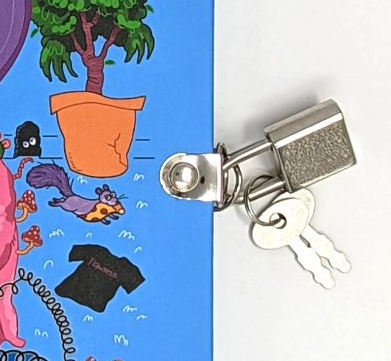
The ‘Adults Only!’ disclaimer ubiquitous to pornographic materials has always been both a warning and an invitation. It seems that Vancouver-based Robin Bougie—creator, editor, and primary writer of the movie fanzine Cinema Sewer—approached his coverage of porn and genre cinema with this dichotomy in mind. Across 34 self-published issues, now collected (and expanded) in eight volumes from UK publisher FAB Press, Bougie explored every manner of cinematic perversion, well-known and obscure. Taking cues from the late '90s fanzine scene from whence it came, Cinema Sewer began as a hodgepodge of text-heavy articles, original art, reproductions of promotional materials, and original comics. It remained so for the duration, even as trends in design and content in the small press came and went. Academic terms belie the accessibility of Bougie’s criticism, but, as a body of work, Cinema Sewer constitutes a refreshingly honest (and thoroughly readable) exploration of the sociocultural and personal politics associated with porn.
Amid his run on Cinema Sewer, Bougie also edited and published eight issues of Sleazy Slice, an adult comics anthology, and authored two volumes of Graphic Thrills, a FAB Press survey of American XXX movie posters from the '70s and '80s. His latest self-publishing efforts include Mount Pleasant, a magazine-sized collection of his contributions to the Montreal anthology Spread Love Comix, and Gutter Hunter, a new annual series which is essentially Cinema Sewer for comics, shining a light on some genuine obscurities; two issues have been released, and a third is in production. I interviewed Bougie via email about the end of Cinema Sewer, the beginning of Gutter Hunter, early influences, gatekeeping, and how the Internet changed his methodology.
-Ian Thomas
* * *
Can you talk about the Vancouver scene at the moment? Are people still mostly cautious about meeting up since the pandemic?
Yes, absolutely. I do find it to be the case. I know that I haven’t really done any big events yet, aside for showing up at a single con and selling some comics and zines out of my backpack for an hour, and then getting the fuck out of dodge. I didn’t really feel comfortable sitting at a table and having unmasked people breathe all over me all day long. I used to do three or four conventions a year, and it used to be that you always caught a cold after the weekend of a con, but now it’s a whole new world, right? They’ve started doing the local comic book jam in person here in Vancouver, and that was always some of the really important glue that held the local comic-creating scene together, so it’s nice to see the gang meeting up. I like that. I haven’t worked up the nerve to go yet myself, but that’s mostly because my health hasn’t been so hot lately (gastrointestinal issues) and I’m just nervous about setting myself back in the progress I’ve made to get healthy again by changing my diet and so on.
Maybe a limiting question, but do you see yourself mainly as part of the Vancouver scene? I think you have a foot in a number of scenes and I wonder if you feel a part of all of them, or maybe if you even feel a part of any of them?
You’re right that I see myself as part of various communities, and I take part in them mostly online. Cult film groups, and indy and underground comix groups, porn historian collectives, and record collecting groups. It’s funny because I get the sense from the way people talk to me that each one of these scenes think of me as identifying solely as being part of that group. Like the people who think of me as “a vintage porn guy” when they comment on my posts on social media, no matter what I’m posting about–even the most benign thing like the birds I fed some peanuts to while on my walk that day–they’ll try to make it about smut somehow. They’ll crowbar in some joke or reference to it, even though it’s not even remotely applicable. I guess it’s just human nature to want to pigeonhole others so you can get a grasp on how to comfortably interact with them?

As I see it, the most of your work is focused on some permutation of three of your passions: Porn, Genre Cinema, and Comics. Did discovering one lead to the others?
Yeah, I guess they have become intermingled, since they are all visual mediums and tend to overlap in interesting ways. There are certain movies and TV shows that got me fascinated with sexploitation/porn history. Boogie Nights, an episode of Miami Vice called “Little Miss Dangerous”, and other things like that... they’re like stepping stones or gateway drugs. Comics were the original passion, though. They came first, and the interest in movies and smut came later. I guess that’s how it is for most, being as comics are/were generally considered a child’s medium. My other passion you didn’t mention though, is music. I’m pretty nerdy about that, too.
What kind of stuff?
I like vintage soul and funk. Donny Hathaway, Marvin Gaye, The Undisputed Truth, Roberta Flack, and the ways that it delves into smooth jazz, like with Ramsey Lewis. I like early instrumental electronica from the ‘70s and early ‘80s. Stuff like early Kitarō, Klaus Schulze, Tangerine Dream, Jean-Michel Jarre, and Vangelis. Stuff like that. I’m also really into modern Swedish alt-pop like The Legends and The Radio Dept. I don’t know, my tastes are a bit scattershot. Been getting into 1970s female vocals in country music this year too. Bobbie Gentry, Tammy Wynette, Jeannie C. Riley, Lynn Anderson. Love that stuff so much.
What were the comics in which you saw the possibility that you might like to make things?
The comics that made me want to make my own comics were things like Sergio Aragonés’s Groo the Wanderer, Scott Shaw!’s Captain Carrot, and Milton Knight’s Midnite the Rebel Skunk. Cartoony stuff. But also around that time, when I was still in elementary school, I discovered old underground comics in the basement of my mom’s pot dealer. He had Crumb comics, and that Bizarre Sex issue where the giant vagina from outer space is fucking a skyscraper [#4, Oct. 1975], and Gilbert Shelton stuff. So that informed my early years in comics in an unusual way too. I mean, don’t get me wrong, I was into all the standard superhero fare of the early '80s too, like X-Men and Daredevil and John Byrne’s run on Superman. It’s just that it made me aware of the other avenues that you could travel down, and still be making comics. Then shortly after that I found Heavy Metal magazine, the adult sci-fi/fantasy comic anthology, and that really became my thing for a good while.
You recently ended Cinema Sewer, your long-running movie zine. I have heard you comment elsewhere that you ended it because you felt it had run its course, but I wonder if you might elaborate on that. Did you initially envision as running as long as it did?
It was a full 25 years from the first issue to the last collected volume (volume 8) that had 80 pages of new material, and 64 pages of full color comics in the limited hardcover edition. Yes, it ran its course. The goal really was just to make a movie zine that I had never seen before. Most of them focus solely on horror (the horror community is robust and almost viral in its ability to take over a scene) to the exclusion of almost every other genre of indie film history, and there is so much more that has happened in cult cinema than just horror. Plus, I really liked the idea of a movie zine that used art and comics to spotlight the visual aspect of the medium, and the way the advertising for films was used to exploit its subject matter.
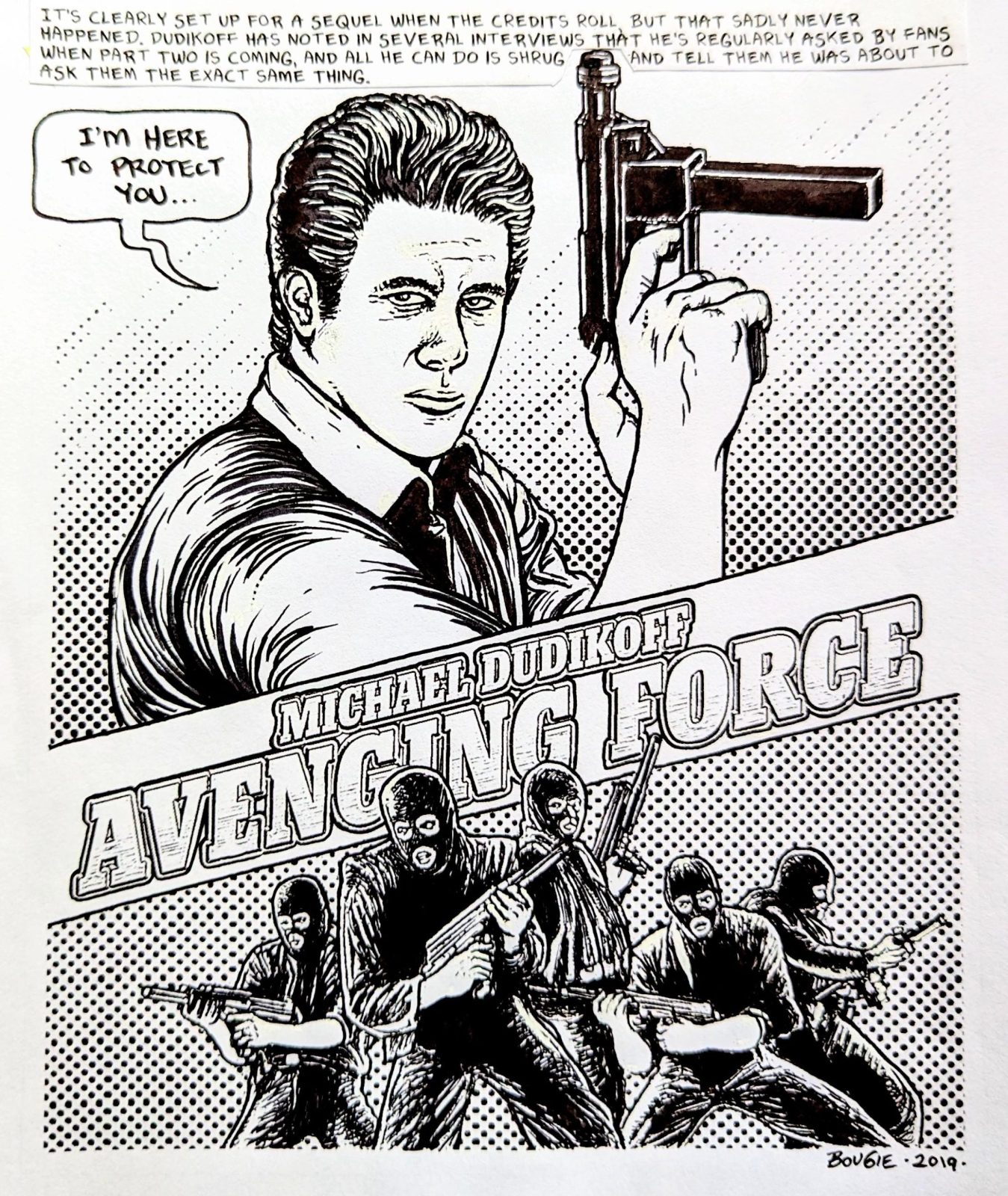
When you work on something like that for 25 years, you start to find that the main momentum for keeping it going is your love of doing it, and I always said that after that wore off, I’d stop. It took a lot longer for it to start wearing off than I thought, to be honest, so I’m pretty proud of how long it went. I just got to a point where I was more excited to research and write about other things, so that’s what I’ve been doing.
Did you catch any flak from people in your life over the pornographic content?
I’ve had a few people who weren’t that comfortable with it that kept me at arm's length, but that’s kind of understandable. People get raised with a lot of baggage about these things. I can’t really say there was a lot of drama or stress about it, though.
Did you find yourself and, by extension, your audience, engaging with the materials you covered in a consistent way throughout the run of Cinema Sewer? Do you find some vacillation along the spectrum of ironic appreciation and earnest appreciation?
I don’t really enjoy things ironically so much. I mean, sometimes what initially draws me to a cult movie is how crappy and funky-looking it (or its promo materials) is in terms of technical execution, but if there isn’t some kind of passion there, even with the low budget, I’m going to be bored and turn it off. So the things I get off on, I like earnestly, no matter if they are culturally respected and deemed legitimate and “cool” or not. I think that comes through in my writing, and I think the audience picks up on that, and they appreciate it. Occasionally I make fun of how shitty something is in the pages of Cinema Sewer, because it’s important to not be predictable, but mostly I find that kind of stuff doesn’t have legs. It doesn’t track years later when you look at it again, because even though you were trying to be cute you were also sorta obnoxiously acting like you’re better than the entertainment you engage in. For the most part, what I’ve done with Cinema Sewer is a pure celebration of the oddities and originalities of the less mainstream elements of filmmaking. I think that’s important. I usually leave it to the normies to do the smirking and wincing.
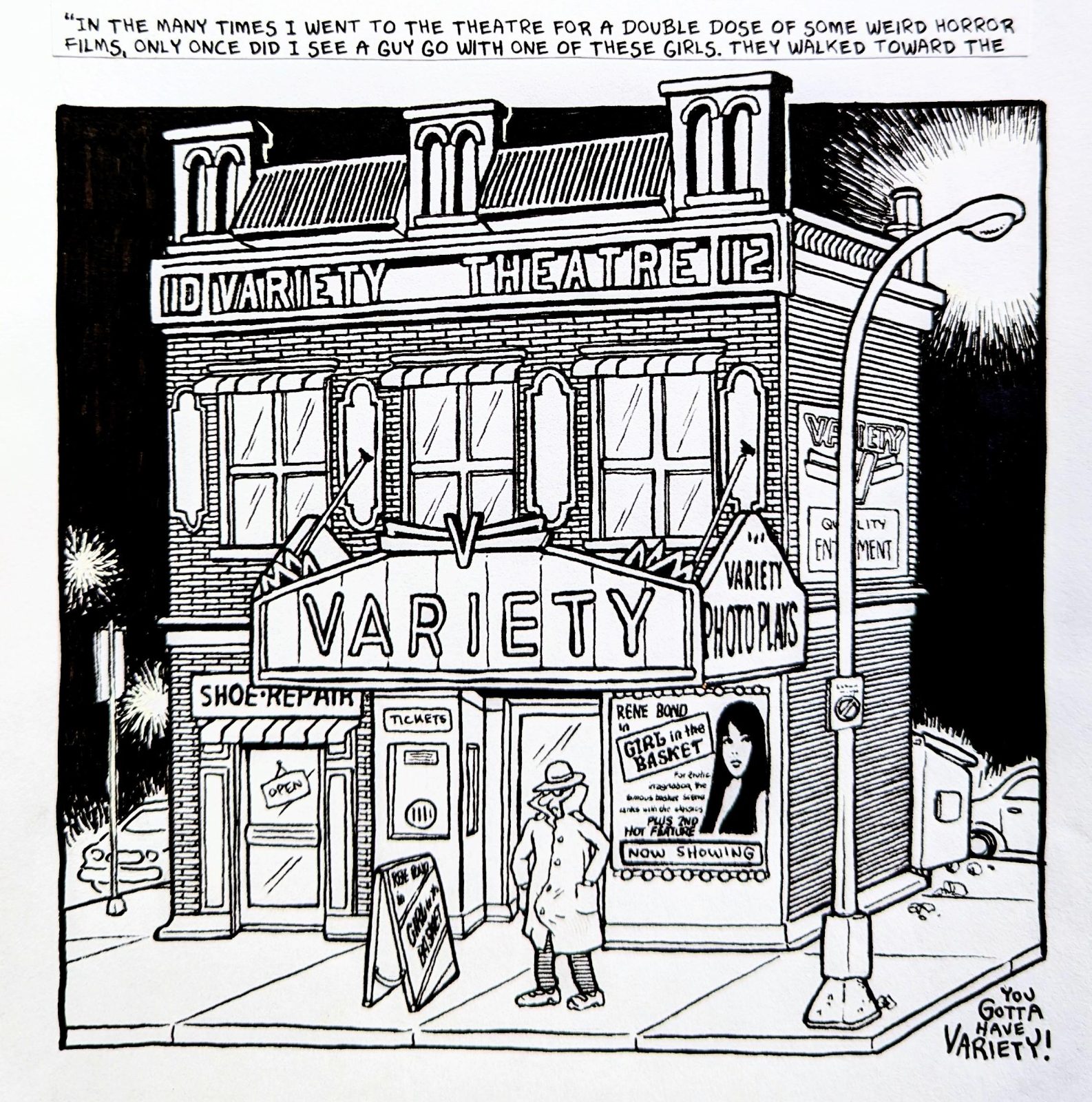
Maybe I am misunderstanding the audience, but did you find that readers needed coached or prodded to engage with the material in the earnest way you were writing about it?
I don’t really know. I just make the work and hope it lands. It’s hard to say how people react to it on their own. Generally I find people are pretty savvy and can figure out what you’re doing without you holding their hand and walking them through it. I do try to not assume everyone is an expect or a lifelong fan with geek knowledge though, so I’m careful to explain my references and trivia in a clear way.
How has the rise of reissue labels like Vinegar Syndrome changed the environment? A lot of your writing seems to focus on the joy of discovery, and maybe even being the first to tell people about some of this stuff. Do they dilute your enthusiasm?
No. I’m not the type that has a gatekeeper mentality. I don’t feel like because I was excited about some obscurity before 95% of the other people in the film community, that I then have some kind of “ownership” or right to lord that over others. That’s the opposite of everything I’ve tried to do, and yeah, you’re right... CS does focus on the joy and discovery of this hobby. I write from a personal standpoint, because that’s what excites me in other people’s writing, and when you’re coming at it from that angle, you’re pinpointing the sense of discovery, and why the movie was so engaging. But no, I could give a rat’s ass about who was “first” or who is the biggest fan, or any of that toxic garbage. The more the merrier. I’ve been lucky enough to get to write some of the liner notes and do the cover art for some of these movies coming out from all these boutique labels, so I’m glad I’ve still got my fingers in the pie.
In what ways did the internet change your critical approach and your assembly of Cinema Sewer?
Good ways and bad ways. The good is that it made it soooooo much easier to research and compile info. Previous to having the internet, when I started CS back in the ‘90s, I had to rely on the library or whatever film books I had, and I made so many factual errors in those early issues. So it was a huge help to be able to Google, finally. I also found that debating or conversing with people on social media about movies and other topics helped my creative non-fiction writing so much. It helped me learn how to structure an argument and my own thoughts on a subject, which other types of writing hadn’t really prepped me for properly. Negatively, I find that sometimes toxic geekdom can kill my enthusiasm for things if I get too immersed in it, especially if I’m witnessing the way that people define themselves by their pop culture interests, and take on a very defensive attitude. A lot of times the worst part of something is the other people who are fans of it. Like sports, for instance. But generally I can steer clear of that shit if don’t wade into the deep end of the collector pool.
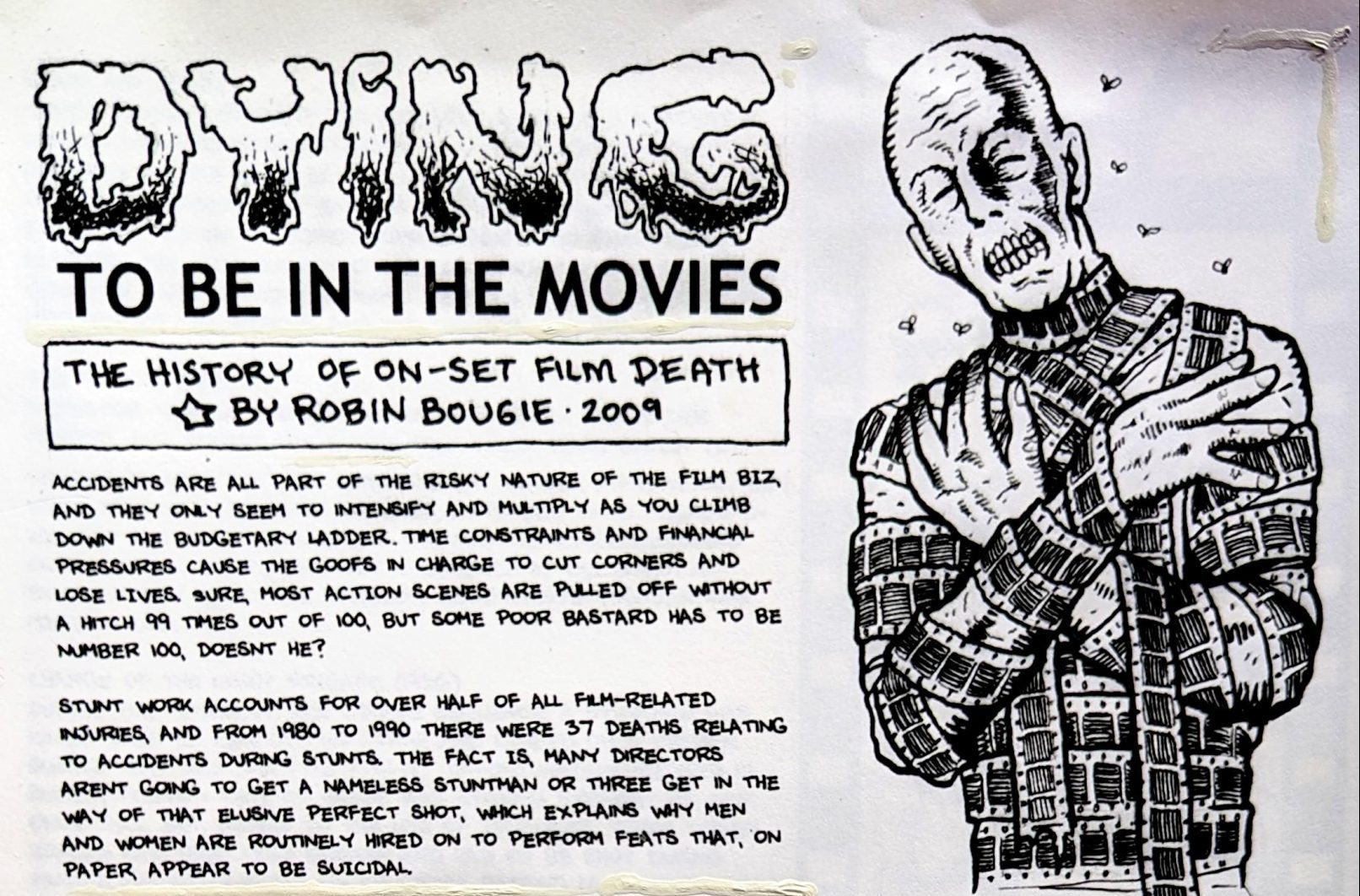
Pornography became more ubiquitous and socially acceptable over the course of your work on Cinema Sewer. Did that change the way you engaged with it?
I don’t think so. I like playing up the “sinful” and “wild” aspect in a playful way. Like a carnival barker. “Step right up and see the most deranged and perverse sights you’ve ever laid eyes on!” Selling the sizzle, they used to call it. Having fun with the idea that sex is “bad” or “wrong” in a polite society, even if, as you say, it has become more socially acceptable. All the more reason to bring a little bit of the dangerous spicy flavor.
Gutter Hunter is your follow-up to Cinema Sewer. The format is similar, but comics are the focus. Is your approach to assembling Gutter Hunter much different?
It’s pretty much identical. Just with a new (but similar) subject matter. Instead of underground, independent, disreputable genre obscurities from yesteryear on DVD and blu, they are in comic book form. I research and shop for the format in a similar way. I track down the people who made the content in a similar way, and I rely on my connections in the community in a similar way.
Can you talk a little bit about how you plan out an issue of Gutter Hunter? Is it a matter of deciding what you want to write about first, then going and completing those pieces? Do you work on various articles at once until you have enough for an issue, then do layouts?
Yeah, there are certain comic creators that I want to shine a spotlight on, and certain comics that I have never seen anyone write about, so those are often a focus. I'm often working on writing and researching half a dozen pieces at once, and adding to them as I find out more info, or as I am able to get interviews and flesh out the story. Then once I know the writing is finished, I start thinking about what images I want to go with it, and I begin planning the layout of that article. Since I do my layouts all by hand, it's a lot of cutting and pasting and lettering and photocopying. Then I scan it all in, and send the files to the printer when it's done.
How much of your art process is physical and how much is digital?
A lot of it is physical. I will do some things digitally.... like, for decades I hand-lettered everything, but now it's about 60% a font I made out of my hand lettering, and I print that off and cut and paste it where I want it. I also sometimes add dot tone or something else to my inks on my art with photoshop, and stuff like that. I still do a lot of my coloring by hand, with markers, but then I scan it in and dress it up a little in photoshop. Add some pizazz.
When it comes to the rarities you are looking at for Gutter Hunter or Cinema Sewer, do you prefer to have a physical copy over a digital copy? Are you just happy to get it?
Almost always I like to find it in person, and be able to have it in my hand, but barring that I'll settle for what I can find online.

Am I correct that you are self-taught? If that's the case, how do you think that has informed your work habits?
Yeah, self-taught. I certainly think it's made me unique, anyway. Nothing else quite looks like what I do, I don't think. I'm not sure, really. I guess everyone is pretty unique when it comes to their process, so I'm not that special.
Your wife, animator and art director Rebecca Dart, figures prominently in your writing. Can you talk a little bit about your creative life together?
Rebecca is my biggest inspiration. She's a really tremendous artist. Even though we don't work in the same style or cover the same subject matter (she's more obsessive about dinosaur art and drawing gorgeous flora and fauna), I am pushed and compelled to create just being around her. When you have two people living together, both striving to make creative work, I think it creates a space where a high priority is put on that. I mean, she features prominently in my work, because she features so prominently in my life. I strive for honesty and transparency in what I do because I think it makes for more compelling content, so I guess it's hard for me to leave her out because of that.
I also have a similar thing with my studio mates, at the art studio I share about seven blocks from our condo. The comic artist who sits right adjacent to me is James Lloyd, who drew many of the official Futurama and Simpsons comics for a good ten years or so. He's a big inspiration too. It's a bit of a revolving door in the studio spaces we have, but other pro comic artists that have been up there with us are Johnnie Christmas, Pia Guerra and Simon Roy. I think when you surround yourself with other creatives, assuming you get along, it works as a positive reinforcement and a method of motivation.
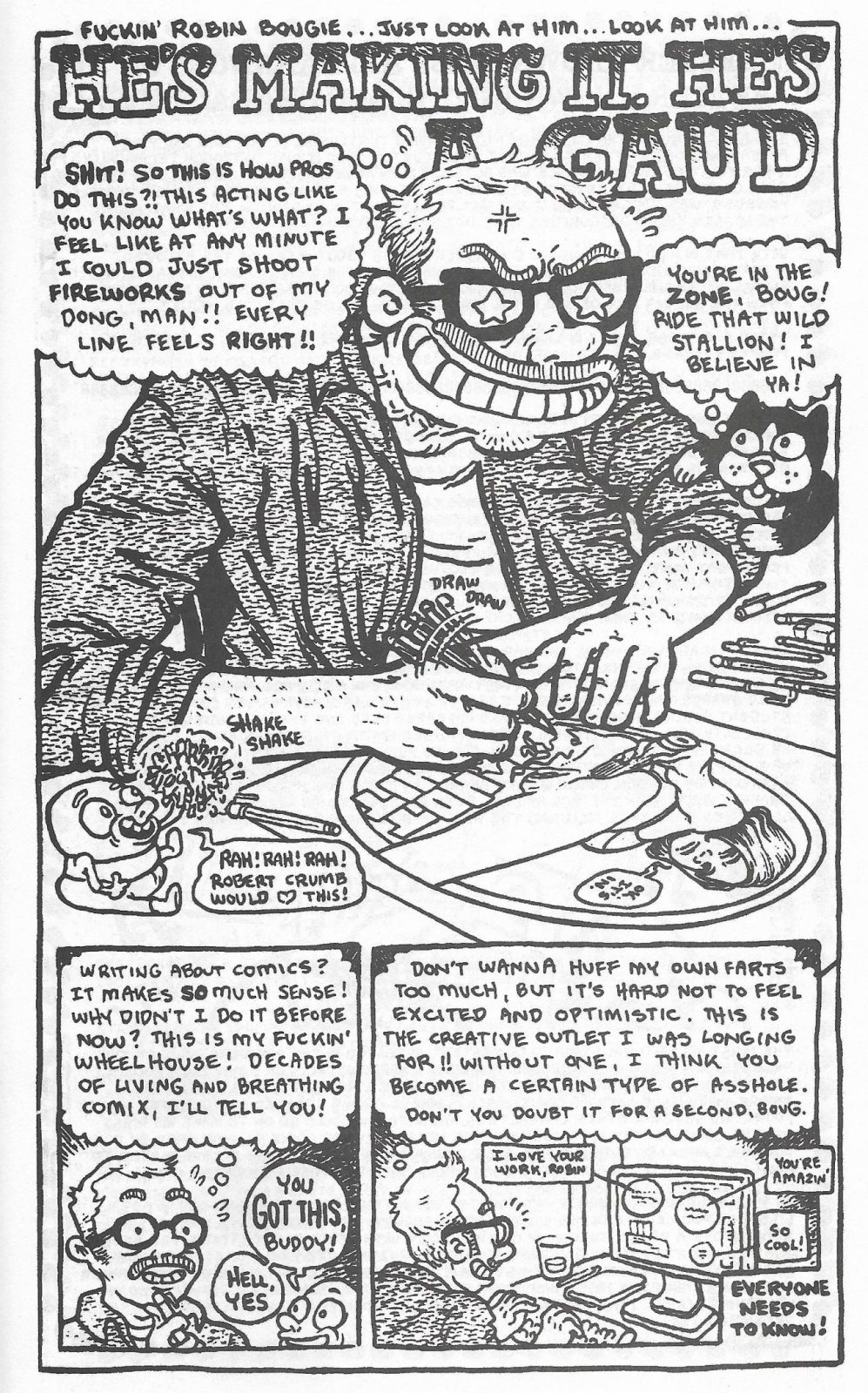
You have niche interests. While there is no shortage of folks who share your passion, there is probably an upper limit. I wonder if that ever affects how deep you go on a subject or stifles your enthusiasm? I think that drive to hip people to something that was never on their radar must be pretty strong.
I find that it really doesn't matter so much if someone is a fan of what I'm writing or drawing about, as long as I'm able to make it interesting to read about. I mean, it helps if they're somewhat well-versed in that medium, but it doesn't have to be that way. But yeah, I do love getting a chance to open people up to new stuff, I gotta say. It's such a good feeling when someone tells you that you made them a fan of some movie, or comic, or whatever it is. That's nice.
Technology like YouTube, podcasting and social media have allowed people to engage critically with content that might be fodder for coverage in Cinema Sewer or Gutter Hunter in a way that is maybe less labor-intensive than the way you have been doing it for a long time. I get that is part of the appeal of these tools, but I wonder if anything is lost in that ease of use? Do you feel any particular way about it?
I’m a bit of a dinosaur in that I like doing things in print, the old-school way, but I think there’s definitely a place for that, especially as less and less people create media in that fashion. Makes it more special than just being yet another blog or YouTube channel. I don’t mind being unique. That’s a plus not a negative. I don’t mind blogs and YouTube channels, though. I watch tons of YouTube!

Portraiture figures prominently in your work. Can you speak to your methods? Is it all drawing from reference? Lightbox?
Yeah, it's not something I used to be that good at, but I've spent a lot of time in the last six or seven years practicing it. I use photo reference, yes. Almost always draw from photos if I'm doing portraits, although I like to use multiple images of the subject to work from, so you're not just some kind of human photocopier, reproducing an existing image. I want to make something new, but that still looks like who I'm trying to capture. I do sometimes work over top of photos to get the right dimensions down quicker and more effectively, yes. Lightboxing is a really useful tool if you use it properly, and don't abuse it. It's like any tool in that way, I suppose. You can always tell when someone's used it poorly or overused it, if what they drew looks traced and stiff, or if they've copied another artist's work. Don't do that, kids.
In Gutter Hunter #2, you wrote a piece about leaving money on the table by being picky about what commissions you'll take. Am I correct that this has been an ongoing issue for you?
I'm just picky, I guess. I love doing commissions, and find it really satisfying, but I'm just picky about what I'll draw for money. I guess I'm just always trying to play to my strengths, and don't want to hand in substandard work, and if I'm not feeling it, it'll suck. So I may as well not take the job if I'm not feeling it, right?
What is your idea of a perfect commission request?
A client who pays up front, gives you a clear idea of what they want and what they don’t want, gets out of your way and lets you make it, and then lavishes you with praise and sings your praises to their friends afterwards, hahahaha.
You wrote another piece in Gutter Hunter #2 in which you commented on cancel culture. You wrote:
"Cancel Culture" as a concept is sort of like "The War on Christmas". [It's] inflated to the point of being a boogeyman that the media uses to freak everyone out and get outrage clicks. When you actually research what the "cancel" is, it usually ends up being one person or a few people who don't appreciate something/someone.
With that said, there are times when the subject of the story, the target of cancellation, has done real harm. As it relates to communities where people do their work, such as the cartooning community or the porn community, what role do you think participants have in guarding their spaces? When a bad actor breaks that trust, should they have a way back in?
I do really feel that way about cancel culture, yes. People are so sensitive about the idea that they might be getting cancelled or censored that they're waaaaay overreacting to what is going on so much of the time. And the irony is that they think the ones getting offended are the ones being oversensitive! And sometimes they are, actually, sometimes people are getting their lives and their careers thrown into disarray by some kind of "woke mob" overreacting to whatever they said or drew or whatever it is, but overall I think it's something a lot of people on social media complain endlessly about far more than it actually happens. Generally, if you're a good person, being good to other people, and not looking to fuck over others, you really don't have much to worry about in terms of some overly-righteous group coming for you. I mean look at me, I make hardcore pornography. You would think I'd be the first one to get cancelled. No one gives a fuck. My biggest enemies are corporations and platforms slowly drying up all the various options and venues for showing my work and getting paid for my work. That's a different kind of very real censorship, and it applies to anyone who isn't a big dog trying to make a go of it. All these companies want a cut of the tiny bit of money I get, to the point where it's very hard to even justify selling your work sometimes. That's the real cancel culture - capitalism.
Are people missing the forest for the trees in this regard? I think the concept of offensiveness engages on a political (or moral) level, and I think that’s probably too often lumped in with interpersonal conflicts. I think being “offensive” in depicting pornography is different than being, say, a bigot or a sex pest, which is what I was getting at with my comment about guarding spaces.
Yeah, that’s a good point. I think you’re right that it does often get lumped into interpersonal conflicts. And yeah, being a smut monger is definitely different than being a bully or a racist, now that you mention it. I guess society is just always changing and fluid about what they will tolerate and deem worthy of scorn. Casual racism and bigotry used to be far more socially acceptable than being a pornographer, even just 30 or 40 years ago, and now it’s totally the other way around, at least in the circles I travel in. I guess change is natural and normal, and you just have to ride the wave of the times.





